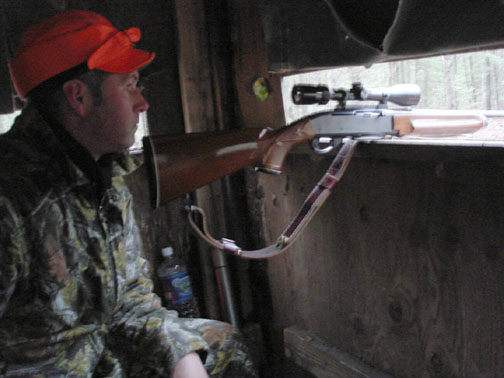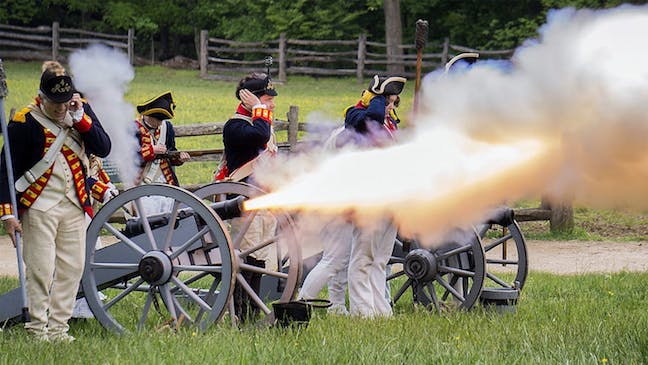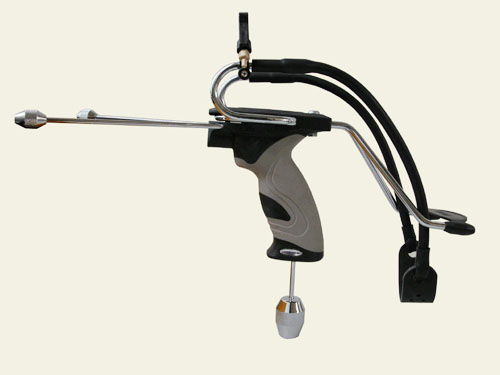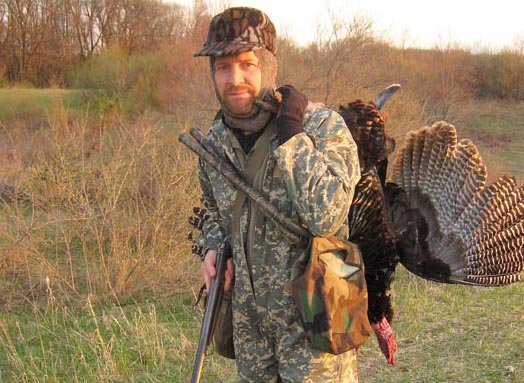Deer Camp 2006
We got skunked.
(Well, one of us got a nice doe at last light on the last sit—can’t slight her. She’s tasty vittles in the freezer. Thank you. But the rest of us got nuttin’.)
Most of us saw deer on opening morning. Does. We passed them up hoping for bucks. They never appeared.
But the six of us had a nice time anyway, sitting in the woods. Chatting around the cabin fireplace. Having nice snacks. A couple of us have started puffing pipes since last year. A couple of us have new rifles. Well, new to us. Darn old ones, actually. Two of them being the quintessentially classy Savage 99’s, one in the super sexy slender .250 Savage caliber and possessing a curvacious Schnabel fore-end and curved steel buttplate—Ooooh…
Late at night, after the first day of lots of deer, Tommy, who didn’t see a thing, got worked up. He ranted about how everyone had passed up all sorts of tasty deer. That we had spent the day comparing the various kinds of grunts and bleats that the deer we saw made. He yelled, “It’s been ‘It was too brown,’ ‘It was too fluffy’ all day! This ain’t no National Geographic Nature Hour! We need some meat!” Then Mike yelled, jumped up and took off his clothes and said “We gotta restart this hunt! To the pond!” And everyone started hooting and hollering and taking off their clothes. And I said Oh no… But I eventually succumbed to peer pressure and we all followed Mike, who ran off the diving board and jumped into the pond carrying a big flaming candle. I mean, it was midnight and snowing and the water was maybe 40F. Yow. Then we all ran back and huddled around the fire. “Like a reverse sauna” some said. I suppose it was invigorating. We got one little doe out of that bargain with the gods.
I saw a pileated woodpecker up close one morning.
I heard an owl swoop down on a red squirrel that had been chattering at me. Just the sound of feathers whooshing then no chatter. A half hour later I saw the squirrel skulk to his hole from wherever he was hiding.
I saw huge coyote tracks the morning after the snow.
Some of us saw grouse and ravens.
There was plenty of deer sign. Not much fresh buck sign, though, really.
As I drove away from deer camp I almost hit a buck. I had the flicker of an urge to steer toward it. I had the flicker of a sense of Hey, there it is, finally! But then I braked and swerve the other way.
Martha did the neatest thing for Deer Camp this year: during the past year she found nice wool shirts during her thrifting, then also found name patches to match our hunters and sewed them on, then sent them all with me to give out when I arrived. They were well received. And worn daily.
***
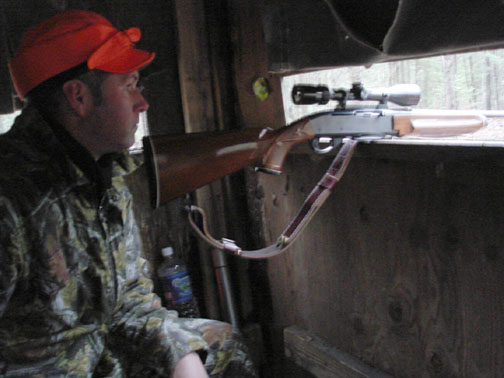
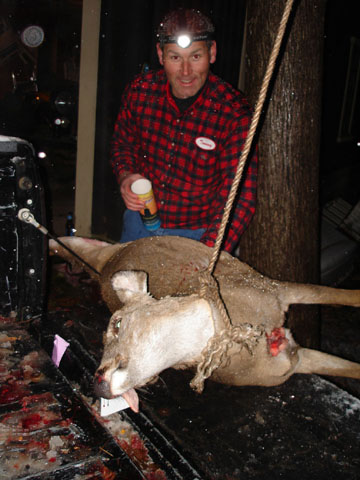
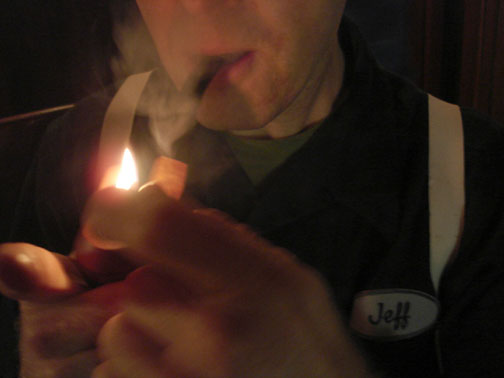
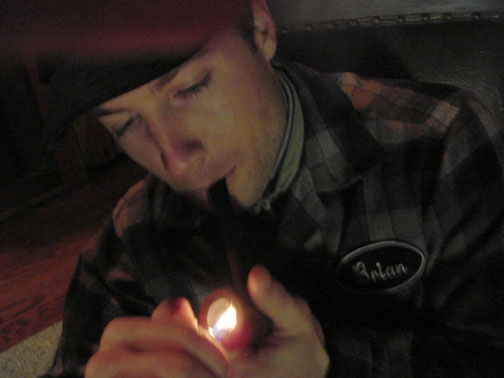
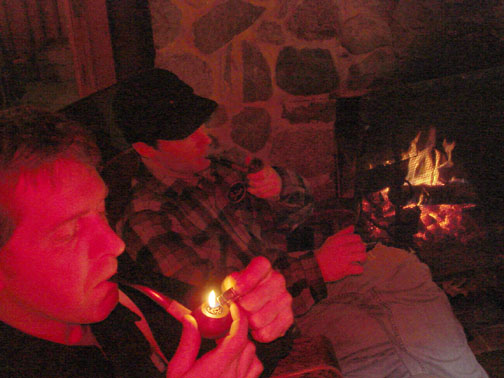
So…
WHY HUNT?
I hunt because I eat meat and I like being connected to my roots. I eat veggies, too—and so we grow a garden. I also love to eat the fish I catch.
I also do all these things because all the food I get this way is far, far better than what you can get from the store or any restaurant. The world’s best restaurants are best because they most closely approximate what you make for yourself from fresh ingredients at home or with friends. That’s what they’re trying to imitate and ritualize. Some do a good job of it.
I like to get things from the source. At least every now and then.
I don’t hunt or fish or garden all that much. Just enough to keep my hand in.
Living close to the source, or at least somewhat connected to it, is important to me in general.
So that’s one reason.
Even if you don’t eat meat you’re responsible for animals. As civilized humans we’re in the animal husbandry business. And wherever we are, they aren’t, by and large. We impact them. We need to watch how this goes and take ownership of the process. We want healthy, diverse animals. Doing this involves killing some of them. Or at least being responsible for their deaths.
Then there’s the death as a part of life idea. Doctors don’t kill, they “do no harm.” They don’t like death—they want to stop disease. But the funny thing is that they don’t really know health or study it to learn their trade. What do they study first? Cadavers. What do they know best? Disease. Doctors mean trouble, not good times. Keep death away from the docs. Can we keep death away from life? It’s funny how doctors are thought of as anti-death but death and disease is their game. Whereas strong life itself suggests an aware attitude to death. It’s half the game, after all. No one goes to the anti-death folks for advice on how to live. Life isn’t the same as anti-death.
I don’t know where this is going, but there seems to be something to it.
In any event, death is a major, necessary part of nature.
So I figure hunting puts me in touch with my dominant role over animals, which involves having plenty of them killed anyway, and is there whether I like it or not. So I figure being pro-active about it gives me a better idea what’s going on.
Then there’s death as land management. Or killing as engagement with the land.
Hikers and picture-takers do indeed leave nothing but footsteps and take nothing but pictures and little bags of their poop (pack it all out!). I like being more a part of the scene than that sometimes.
Gardening is involvement with the land, a particular small part of it, usually. Land restoration and river improvement are also engaged with the land.
I think that taking food from the land in terms of plants and animals gets you connected to the land. You put your hand in the game. Stake a claim. Are a stakeholder.
I also see hunting as creative engagement, immersion and inclusion. I’m making myself a part of the life cycle. I already am, of course. But I’m creatively acting so that I know that I am. I’m asserting not so much my predator role, which is narrow, but my overseer participant hands-on role.
Hunters are A-#1 protectors of habitat and are aware of it to beat the band.
Hunters and other woods-gleaners often REALLY know the woods, including much of the other biology going on. It’s all connected, after all. A good hunter knows the weather, the birds, the trees…it all gives him clues.
As soon as one starts hunting some land one becomes de facto a land manager. A plan is then a good thing to have. And a plan is something you submit to. You decide how many rabbits you can take from a certain swamp holler each year without hurting the rabbit population there, how many to take to keep the population vigorous. You don’t hunt it out nor do you let them overrun. You limit yourself. Of course the sport of hunting in many cases limits you as well, but often that’s in a general way. You have to limit yourself often on the land you hunt.
In fact, it’s not really your hunt anymore. Once you start hunting you participate in The Hunt. It’s bigger than you. Once you get enough, you stop. If you take too much, you’re wrong—it’s a bad idea, you hurt yourself and the land. A given piece of land can only take so much pressure. It’s up to you to know how much. To be careful. To work with others. Most huntable land has already been hunted for millenia, eh? We’re all newcomers. We need to leave the land as good as we found it. No, we need to improve it. Our hunting can be a part of that, shape it.
It’s like a farmer isn’t just farming his land. He’s usually part of a soil conservation district. There’s a plan in place for sustainability and improvement. He accepts his role and even works to improve on it. Same with hunting and fishing.
I hunt also because I’m an animal, too. Now, I can’t act like an animal. I’m obliged to ever higher consciousness. Does being a human mean that I take the vow of a doctor, to “do no harm.” Maybe. In a big picture sense. Sometimes even a doc has to cut off a finger to save a hand. So we can’t get too literal about this stuff. I’m a predator, I have canine teeth, I eat meat, etc. I don’t think that being human requires veganism. Some adopt this as their spiritual practice.
I use hunting as part of my spiritual practice. I connect to my food, to my roots, my family, my heritage and land via hunting. Even to my people and to other peoples. I connect to Native America via hunting (and other activities and mindsets).
The path to higher consciousness involves suffering and death: our own. To our egos. We can’t inflict this on others except in the case of nature management and defense, in which case pruning and control are good things.
I don’t overdo the animalism stuff. I don’t eat tons of meat. I hunt moderately. Sustainably. To me, hunting is a hands-on practice of sustainability.
And I’d rather eat hunted meat than corporate meat anyday.
Note that I don’t say that hunting is about the kill. I’m ambivalent about the kill. Sure it’s about the kill, but the kill is regrettable. I’ve said “yes no yes no” about all of them so far. One wants to make a good kill—that is, quick, as less of a kill as possible. Does a fisherman go fishing just so he can see a fish breathe its last? Does that give him a thrill? There is a thrill—of luck, good fortune, seriousness, responsibility, anxiety.
No, a hunter wants a kill to be quick. Of course, outside of sport, death is slow and horrible for humans and animals alike and occurs at just about the same frequency. Animals wouldn’t die any less often if they weren’t hunted. The goal of hunting and fishing is to make the death far better than nature.
In fact, one is responsible to do so. One is obliged to be good enough to ensure a quick kill at whatever kind of hunting or fishing one elects. This is a burden of solemn duty that requires sportsmen to practice for long serious hours for much of their life, in millions of cases.
If we could eat animals without killing them we would prefer that. But as long as there’s death and as long as we benefit from the death of animals or their life cycle in any sense (paving a road, plowing a field) those interested in integrity take responsibility for the cost of their thriving.
The kill is maybe 5% of the game.
Technically, scouting and knowing the land and nature is 50% of the game. Hunting skills are 15%. Dragging, carrying, gutting, cleaning, processing…then cooking…is 30% of the game.
It is a game, too. Some people say, Ugh, what a barbaric sport! Actually, it’s a dualistic double sport. Between man and animal it’s sport, but it’s active/passive sport—on the animal side it’s passive. The animal is basically all on defense. And it has a worldclass defense. Even if it doesn’t know it. The fully active sense of sport is between the humans involved. This relates to the rules of hunting and bag limits. There are only so many animals to go around. So we have to play fair. One then hunts or fishes within those limits. One can participate in many kinds of hunting and fishing depending on the degree of difficulty one wants to take on and there are often legal or even just social rules to go along with them. There’s even a third level of sport that combines the two previous modes, and that’s trophy hunting. Bigger critters are smarter, their defenses are far better and they’re in demand by more sportsmen. Getting one is a success in the sport, and is likewise often regulated—woods and lakes often have limits on the bigness of game that can be kept or shot. One wants to leave enough big ones. When one hunts one takes a try at a serious sport, indeed. It’s a challenge with meat on it.
I note that ballsport has no impact on the land. Heck, it often has little impact on the people. It’s about the ego, not about relationships, even for all the talk of teams. Most of the substance is hype. Modern sport makes for an inspiring or cautionary story sometimes, but that’s about the best it does. Hunting involves something more needful. Land, nature, food, help, freedom, initiative, responsibility, stakeholding. I think it can readily create good bonds between everyone involved.
Does that make any sense? I know I was rambling. But I’m not sure I’ve heard it all put my way before, so that’s why I bothered.
